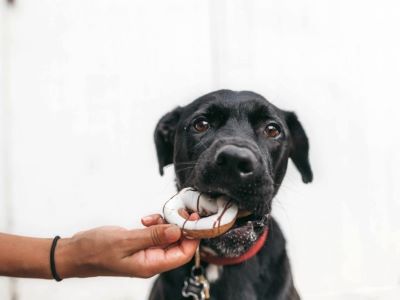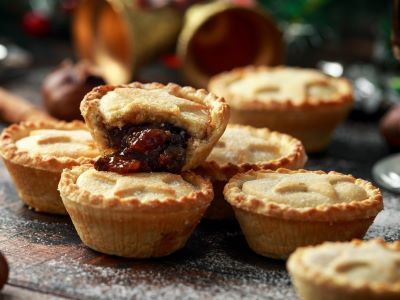Pastries are precious delights to us humans, but “Can dogs eat pastry?“
In this guide, we will talk about whether dogs can eat pastries and baked ‘goods’.
Dogs depend on us for proper feeding and to keep them from harm. Today, we’re sinking food world to find out if dogs can eat this flaky feast.

Can Dogs Eat Pastry?
Pastries are not made for dogs. Most pastries have ingredients that are difficult for dogs to digest properly and can cause stomach issues.
Pastries tend to be very high in sugars, fats, and calories compared to a dog’s natural diet. Eating too many pastries can lead to obesity, diabetes, and pancreatitis in dogs.
Before we dive into the tempting world of pastries, it’s vital to understand that our dogs have a different digestive system than we do. Let’s understand pastries in detail:
Types of Pastries
Here are the types of pastries in detail:
1. Sweet Pastries
Sweet pastries are sugary delights, ranging from cakes to doughnuts, each tempting taste buds with a burst of sweetness.
Common Ingredients:
- Flour: The basic building block, providing structure.
- Sugar: Adding sweetness, but beware of excessive amounts.
- Butter: Adding richness, but moderation is key.
- Fruits and Chocolate: Tasty additions but with considerations.
- Sweet Pastries are Cakes,
Pies,
Cookies, Danishes, and Doughnuts.
Can Dogs Eat Sweet Pastries?
Dogs can enjoy a bit of sweetness, but high sugar content may lead to weight gain and dental issues. Chocolate, a common pastry ingredient, is a big no-no for dogs.

It contains theobromine, which can be toxic. Overindulging in sweet pastries may lead to obesity, pancreatitis, and other health concerns.
Moderation is key!
2. Savoury Pastries
Savoury pastries are a savoury sensation, combining flaky crusts with hearty fillings, often featuring meats, vegetables, and cheeses.
Common Ingredients:
- Flour: Still the foundation, but with a savoury twist.
- Butter or Savory Fats: Adding richness and flavour.
- Meats, Vegetables, and Cheese: Hearty fillings provide a savoury punch.
- Savoury Pastries are Puff Pastry with Meat Filling, Empanadas, Quiches, Meat Pies,
and Savory Turnovers.
Can Dogs Eat Savory Pastries?
Moderate fat content is acceptable, but be cautious with rich and heavily seasoned fillings. Opt for lean meats, and avoid overly processed or seasoned options.
Savoury pastries, if not chosen carefully, may contribute to weight gain and digestive issues in dogs.
Being Aware of Specific Ingredients
Here are some specific ingredients to be aware of, please make sure you do not include this in the pastries you are gonna feed your dog too:

- Xylitol: A common artificial sweetener in some pastries, xylitol is highly toxic to dogs. “It can lead to insulin release, causing hypoglycemia, seizures, and, in severe cases, liver failure. Always check for xylitol-free options”, confirms Renee Schmid from VCA Hospitals.
- Pancreatitis Risk: High-fat content in pastries can trigger pancreatitis in dogs, leading to inflammation of the pancreas. This painful condition can result in digestive issues, vomiting, and lethargy. Opt for pastries with moderate fat levels.
- Garlic and Onions: These common savoury ingredients can be toxic to dogs, leading to anaemia and other health complications[1]. Ensure pastries are free from these ingredients or other harmful seasonings.
Potential Risks
Precious pastries come with potential problems as well. Let’s understand these risks in detail:
Obesity
Pastries, with their delicious mix of flour, sugars, and fats, often pack a calorie punch. Excessive calorie intake can lead to obesity in dogs, which is associated with a bunch of health issues.
From joint problems to cardiovascular strain, the consequences of obesity can significantly impact your dog’s well-being. Practice moderation and balance in treating your dog.
Consider the overall calorie content of your dog’s diet, factoring in treats, to maintain a healthy weight. Opt for low-calorie dog-friendly treats or fruits and vegetables as alternatives to high-calorie pastries.
Pancreatitis
The pancreas plays a crucial role in digestion, producing enzymes that break down food.
However, when dogs consume high-fat pastries, it can trigger pancreatitis, a painful inflammation of the pancreas. Symptoms may include vomiting, abdominal pain, and lethargy, and in severe cases, it can be life-threatening.

Choose pastries
Toxicity
A few ingredients generally found in pastries can be toxic to dogs.
For example, chocolate, often used in sweet pastries, contains theobromine, which dogs struggle to metabolize and can lead to symptoms ranging from restlessness to seizures.
Other toxic ingredients may include artificial sweeteners like xylitol or seasonings like garlic and onions.
Be vigilant about the ingredients in pastries. Avoid sharing treats that contain chocolate, xylitol, or other known dog toxins. Familiarize yourself with safe and unsafe foods for dogs and always read ingredient labels.
Safe Alternatives
Some pastries may be harmful to dogs but there are some dog-friendly safe alternatives too. Let’s explore them:
1. Homemade Treats
Homemade dog treats are a fantastic way to ensure your pup enjoys tasty delights without the potential risks associated with regular pastries.

Simple recipes often involve dog-safe ingredients like whole wheat flour, oats, peanut butter, and eggs. Get creative with shapes or use molds for added fun. Here are some benefits:
- Ingredient Control: You have full control over the ingredients, avoiding harmful additives and focusing on wholesome options.
- Preferences: Customize treats based on your dog’s preferences, whether they love savoury or have a sweet tooth.
- Freshness: Freshly baked treats contain no preservatives and can be a healthier option compared to store-bought alternatives.
2. Commercial Dog Pastries
The pet industry has grown to offer a variety of dog-specific pastries, biscuits, and cookies. These treats are prepared with dogs in mind, often using ingredients that are safe and enjoyable for dogs.
When choosing commercial treats, look for reputable brands that prioritize quality and nutritional value. Here are some benefits:
- Convenience: Ready-made treats are convenient for busy pet owners.
- Formulas: Many commercial dog treats cater to specific dietary needs, like grain-free or hypoallergenic options.
- Nutritional Balance: Reputable brands focus on providing a balanced nutritional profile suitable for dogs.

3. Fruits and Vegetables
Fruits and vegetables offer a refreshing and nutritious alternative to traditional pastries. 
Carrots have a crunchy treat that promotes dental health. Cut into bite-sized pieces to avoid choking hazards. Blueberries are packed with antioxidants and vitamins.
Serve as a handful or mix with other fruits for a fruity variety. Here are some benefits of Fruits and Vegetables:
- Nutrient-Rich: Fruits and vegetables offer a variety of essential vitamins and minerals.
- Hydration: Many fruits have high water content, contributing to your dog’s hydration.
- Low in Calories: Compared to pastries, fruits and vegetables are generally lower in calories, making them a healthier option.
FAQs
 Can Dogs Eat Pastry?
Can Dogs Eat Pastry?
Yes, dogs can eat pastries, but only if they do not contain any harmful ingredients such as avocado, chocolate, or grapes. However, pastries, in general, are not dog-friendly as they have a high fat and sugar content, which over time can lead to weight gain or even obesity. That can lead to other serious health issues such as heart disease and diabetes. Certain fruits, vegetables, and other ingredients commonly used in human foods can be seriously harmful to dogs.
 What Happens if My Dog Eats Pastry?
What Happens if My Dog Eats Pastry?
You should avoid giving your dog pastry for several reasons. Pastry can be high in fat and sugar which can cause stomach upset and the endless filling options could also contain ingredients which are dangerous for dogs. If the sugar substitute xylitol has been used, even a small amount can make dogs seriously ill.
 Can Dogs Eat Cooked Puff Pastry?
Can Dogs Eat Cooked Puff Pastry?
As outlined above, pastry is generally not suitable for dogs due to the high fat, sugar, and salt content and some dogs might be allergic to the gluten in the flour.
 Is Baking Soda Toxic to Dogs?
Is Baking Soda Toxic to Dogs?
Baking soda in baked goods is not a problem for dogs because the amount used is so small. If a dog becomes sick from eating baked goods, the culprit is likely the fat content or a toxic food ingredient (one that is more toxic than baking soda).
 Are Desserts Bad for Dogs?
Are Desserts Bad for Dogs?
While natural sugars like honey, maple syrup, brown sugar, molasses or fruit are generally safe for pets, any sweets that contain chocolate or xylitol should not be given to any animal.
Conclusion
In conclusion “Can dogs eat pastry?” Paws Off the Pastries! We learned pastries and baked goods are not for dogs. We learned pastries and baked goods are not for dogs.
To avoid stomach issues, obesity, and trips to the vet, it’s best to keep them away from pastries.
When in doubt, always consult with the vet. Remember it’s up to us as responsible pet parents to keep them healthy and happy.
Reference:
- Onion, garlic, chive, and leek toxicity in dogs | VCA Animal Hospital








